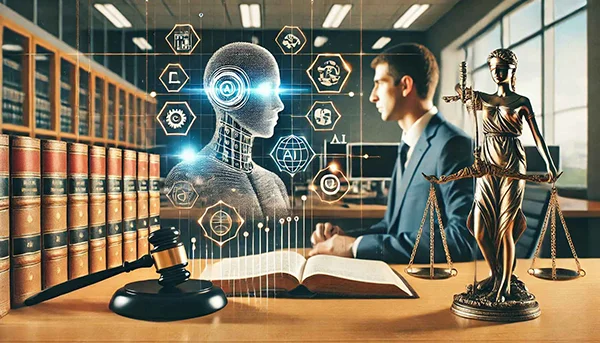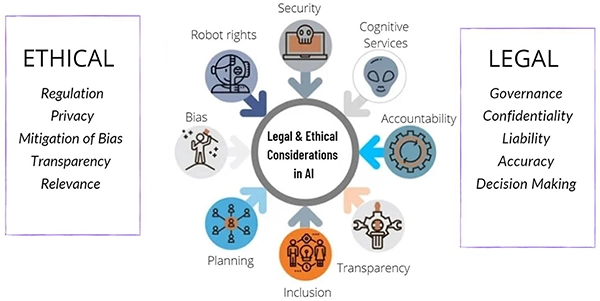Key Takeaways
- AI-based tools are significantly helping lawyers and law firms with time-consuming processes.
- Artificial Intelligence is reducing human errors and increasing the accuracy of various tasks.
- Chatbots and virtual assistants help establish a strong relationship with clients.
- Real-world examples demonstrating how it positively impacts a law firm.
- Ethical consideration is important to maintain data security, confidentiality, and transparency.

I believe AI is going to change the world more than anything in the history of humanity. More than electricity.
—Kai-Fu Lee (Taiwanese businessman and computer scientist)
AI tools have been revolutionizing nearly every field by streamlining processes, resulting in increased efficiency and better outcomes. The global AI software market was valued at $98 billion in 2024; by 2030, it is estimated to reach $391.43 billion.
One of the major sectors that has benefited from artificial intelligence that is the law field. There are specialized tools that lawyers can use to make their work easier without compromising the quality. GallianFirm is one of those firms that has greatly drawn advantages from the integration of AI tools.
In today’s article, we’ll discuss how these tools can be used and what things need to be considered to get the best results.
It wouldn’t be of any use if there weren’t any benefits. AI can easily streamline time-consuming tasks, freeing up lawyers to pay attention to other details and strategic work. Document and research review can be done in just a few minutes; earlier, they used to take hours or even days.
Data analysis has also become essential as it can identify any mistakes that might go unnoticed. Manual work is frequently met with human errors that can later interfere with the work, but AI tools don’t make such mistakes.
For lawyers, maintaining a proper relationship with clients is necessary, and with AI-based chatbots and virtual assistants, all their doubts and questions will be answered immediately.
AI can give the best insights, and based on that, attorneys can make better decisions for their clients, catering to all their needs and requirements. There is generative AI as well that has been majorly contributing to smoothing various maneuvers.
I wouldn’t have been able to make such claims if there weren’t any real-life examples. A firm in New York integrated AI-based software into their day-to-day work, and immediately, they noticed that the time spent on document verification was reduced by 60%.
Another law firm in California opted to adopt predictive analytics. With this, they were able to analyze previous cases, and with the help of key points, lawyers can further use those to make informed decisions on whether to settle things in court or go to trial. They were able to prepare accordingly, which increased their success rate significantly.
These are just a few of the examples of how AI-based tools have been benefiting law firms across the globe.
While AI can be used in various ways, it’s important to use it professionally while coordinating with all the legal standards. One of the major concerns is confidentiality as you enter the sensitive information; there, it can be stored automatically in the database.
It becomes crucial to ensure data security and avoid potential data breaches to maintain clients’ trust with the firm or individual. There’s been several cases where information were stolen.
This not only breaks the trust of the client but also gets you in trouble with the government as there are strict guidelines. It’s important to maintain transparency with the other person and let them know everything beforehand. You must assure them that their data is safe with you.
Educate yourself and other working colleagues about this technology so no one makes any mistakes and takes proper security measures. In the infographic below, you can see several other legal and ethical considerations while using AI.

Artificial Intelligence will open up new opportunities in the law field, and lawyers will be able to present strong cases and increased rates of winning. Its capability of streamlining workflow is already top-notch, but with time, it will become even better.
Since it can analyze a bulk amount of data, it can predict outcomes of cases, and based on that, further changes and strategies can be made. As mentioned earlier, automated document and research review is already saving countless hours, allowing lawyers to focus on other key areas.
As we’re normalizing collaboration with AI, new paths toward innovations are being opened that can assist with complex legal challenges. However, it remains mandatory to comply with ethical considerations and not to misuse this opportunity.
Training staff members is important so they understand how this dynamics work, and they don’t make mistakes. Such tech innovations have are transforming the legal landscape for good.
AI is our future and will introduce further improvements, we have to embrace it and use it accordingly.
FUN FACTAI isn’t a modern-day concept and has been around since 1950’s. Early AI-based models were used to solve mathematical equations and play chess.
AI tools can streamline time-consuming tasks like document and research review. It also minimizes human errors, increasing efficiency.
Some potential breaches might happen; that’s why it’s important for law firms to implement strict security measures.
Artificial intelligence can predict case outcomes and automate workflow, which would later be improved and revolutionize the law field further.
